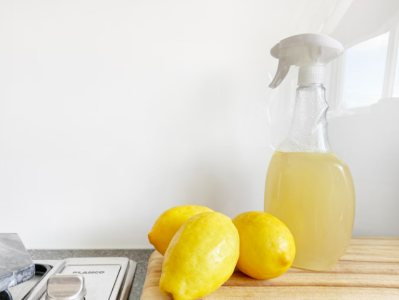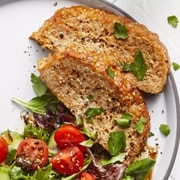Does vinegar really clean everything? Here’s what it works on—and what it doesn’t
- Replies 0
You’ve probably heard it a hundred times: “Vinegar cleans everything.”
But is that actually true—or just another TikTok myth that smells suspiciously like salad dressing?
To get to the bottom of it, we asked two real-life cleaning pros whether this pantry staple deserves its reputation as the ultimate natural cleaner.
Their verdict? Vinegar is a versatile cleaner—but it’s no miracle worker.
Forget expensive sprays. A simple 1:1 mix of white vinegar and water leaves windows, mirrors, and glass tables streak-free. Add a few drops of essential oil if the smell’s too sharp.
“A mix of vinegar and water leaves glass surfaces streak-free,” says Jon Riding, founder of Evergreen Cleaning Company.
2. Destroy Hard Water Buildup
Hard water stains around your faucets and showerheads? Vinegar dissolves them with ease thanks to its acetic acid content.
It’s excellent for limescale and mineral buildup, adds Ahmed Mezil, CEO of Hellamaid.
3. Fabric Softener Substitute
Want softer laundry without irritating additives? Swap your commercial fabric softener for ½ cup of vinegar in the rinse cycle. It fights residue and odors naturally.
4. DIY All-Purpose Cleaner
On sealed tile, laminate, and other non-porous surfaces, vinegar works wonders on sticky messes and funky smells.
5. Natural Deodorizer
Commercial air fresheners often mask odors. Vinegar tackles the bacteria causing the funk.
“Mix vinegar with water and essential oils for a natural room spray,” Mezil suggests.
Also read: Transform your bathroom like a pro with these insider deep cleaning shower secrets
Sorry, but vinegar won’t kill serious germs. It’s not strong enough to replace bleach or alcohol-based disinfectants.
“Vinegar doesn’t kill most harmful bacteria and viruses,” says Riding. Don’t use it to sanitize.
2. Natural Stone (Granite, Marble, etc.)
Vinegar’s acidity can etch and dull stone surfaces.
Also read: He turned cleaning into a joyful ritual—here’s how you can too!
3. Wood Surfaces
That homemade vinegar spray might ruin your hardwood floors or antique furniture. It can strip finishes and even warp the wood.
4. Electronics and Screens
Put the vinegar down before it eats through your device’s screen coating.
Vinegar is incredibly useful—but it’s not a one-size-fits-all cleaning hero.
It's great for everyday messes, laundry, glass, and hard water—but don’t count on it to kill germs or treat delicate surfaces.
Read next: Say goodbye to microwave messes with this mind-blowing cleaning trick you'll wish you discovered earlier!

Have you been using vinegar as your go-to cleaner for everything—only to find mixed results? Share your experience in the comments below: What has vinegar worked wonders on, and where has it let you down?
But is that actually true—or just another TikTok myth that smells suspiciously like salad dressing?
To get to the bottom of it, we asked two real-life cleaning pros whether this pantry staple deserves its reputation as the ultimate natural cleaner.
Their verdict? Vinegar is a versatile cleaner—but it’s no miracle worker.
What Vinegar Can Do
1. Glass Cleaner That Shines (and Doesn’t Streak)Forget expensive sprays. A simple 1:1 mix of white vinegar and water leaves windows, mirrors, and glass tables streak-free. Add a few drops of essential oil if the smell’s too sharp.
“A mix of vinegar and water leaves glass surfaces streak-free,” says Jon Riding, founder of Evergreen Cleaning Company.
2. Destroy Hard Water Buildup
Hard water stains around your faucets and showerheads? Vinegar dissolves them with ease thanks to its acetic acid content.
It’s excellent for limescale and mineral buildup, adds Ahmed Mezil, CEO of Hellamaid.
3. Fabric Softener Substitute
Want softer laundry without irritating additives? Swap your commercial fabric softener for ½ cup of vinegar in the rinse cycle. It fights residue and odors naturally.
4. DIY All-Purpose Cleaner
On sealed tile, laminate, and other non-porous surfaces, vinegar works wonders on sticky messes and funky smells.
5. Natural Deodorizer
Commercial air fresheners often mask odors. Vinegar tackles the bacteria causing the funk.
“Mix vinegar with water and essential oils for a natural room spray,” Mezil suggests.
Also read: Transform your bathroom like a pro with these insider deep cleaning shower secrets
What Vinegar Shouldn’t Touch
1. Disinfecting SurfacesSorry, but vinegar won’t kill serious germs. It’s not strong enough to replace bleach or alcohol-based disinfectants.
“Vinegar doesn’t kill most harmful bacteria and viruses,” says Riding. Don’t use it to sanitize.
2. Natural Stone (Granite, Marble, etc.)
Vinegar’s acidity can etch and dull stone surfaces.
Also read: He turned cleaning into a joyful ritual—here’s how you can too!
3. Wood Surfaces
That homemade vinegar spray might ruin your hardwood floors or antique furniture. It can strip finishes and even warp the wood.
4. Electronics and Screens
Put the vinegar down before it eats through your device’s screen coating.
Vinegar is incredibly useful—but it’s not a one-size-fits-all cleaning hero.
It's great for everyday messes, laundry, glass, and hard water—but don’t count on it to kill germs or treat delicate surfaces.
Read next: Say goodbye to microwave messes with this mind-blowing cleaning trick you'll wish you discovered earlier!
Key Takeaways
- Vinegar works well on glass, limescale, laundry, and odors.
- Avoid it on wood, natural stone, electronics, and for disinfecting.
- Experts say it’s eco-friendly and effective—just not a miracle solution.
- Combine vinegar with other safe cleaners for a complete clean-home routine.







